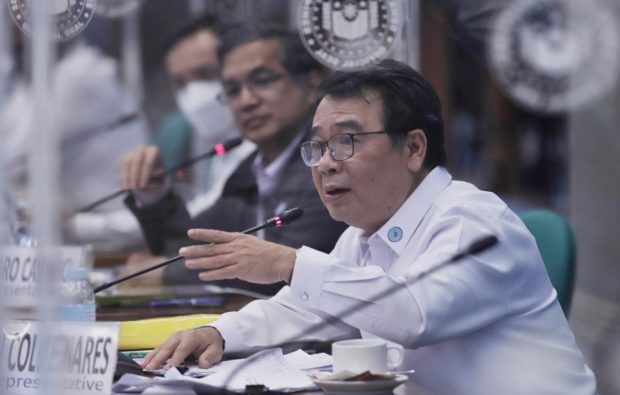
Atty. Neri Colmenares, former Bayan Muna Partylist representative. Senate PRIB file photo / Joseph Vidal
MANILA, Philippines — Since the country’s problems with corruption and poverty did not start with the 1987 Constitution, former Bayan Muna lawmaker and lawyer Neri Colmenares said on Thursday that amending it would not be a solution.
Colmenares explained during the House of Representatives’ Committee on constitutional amendments hearing on several bills that other Asian countries like South Korea and Taiwan did not need huge amounts of foreign direct investments (FDIs) to propel their economy.
The former congressman said this as several bills have lined up at the committee, including amending the 1987 Constitution’s allegedly restrictive economic provisions which disallow foreign ownership of businesses and lands.
“Look at Taiwan and Korea, if you would look at their FDIs […] those are foreign direct investments, look at them, their economies strengthened during the same time we had more direct foreign investments compared to them. South Korea industrialized by creating its own car companies, when the government supported that, the country progressed,” he said in Filipino.
“Ulitin ko lang, ang korapsyon at kahirapan natin ay hindi nagmula sa Konstitusyon, kaya ang pag-amyenda dito ay hindi solusyon,” he added.
(I will say this again: corruption and poverty did not emanate from the Constitution, so amending this is not a solution.)
Colmenares’ presentation included figures showing the percentage of FDIs to the gross domestic product (GDP) of the Philippines in comparison to respective data from three countries — South Korea, Taiwan, and China — which are obviously faring better economically as of now.
The presentation showed that from 1985 to 1989, or including the first few years of the 1987 Constitution, the average percentage of FDIs in relation to the GDP of South Korea was at 0.5 percent, while Taiwan and China both had 0.7 percent.
The Philippines, on the other hand, had 1.1 percent.
“After the 1987 Constitution was implemented, look at 1990-1994, (also in 1985-89) 1.1 (percent) for Pilipinas, only 0.5 percent of the GDP for South Korea were FDIs.,” Colmenares said. “It’s 0.7 percent for Taiwan, so all the while, for the Philippines, we always had a higher percent to GDP compared to theirs, but they are progressive countries.”
“This FDI obsession — I mean, we have different kinds of positions here […] but it should not be the main engine of growth. Are investments important? Yes, of course, but it should not be the main engine of growth. For me Mr. Chair, the engine of growth should be national industrialization, pouring in capital and government support to local businesses and industries. That’s what Korea did, that’s what Taiwan did,” he added.
Colmenares also underscored that having more foreign investments and ownership of the business, just like plans to alter the constitution to give way to foreign land ownership, would pose a risk to the country’s agriculture security and territorial integrity.
“(Would they say that) ‘I won’t invest there because I cannot own land’. But none of them can own land in China or Vietnam, yet both countries attract foreign investors also. So I cannot imagine why land is crucial to investors, that’s why we would sell it to foreigners,” he said.
“Selling land to foreigners is a concern of food security, if it is turned into a golf course, how will farmers plant rice and onions? Does it not concern national security? Of course yes, if China buys all the beachheads there in Mindoro and Palawan, that’s a national security problem,” he added.
At least two resolutions have been filed calling for amendments to economic provisions: Resolution of Both Houses (RBH) No. 2 by the former speaker and Marinduque Rep. Lord Allan Velasco wants changes in Article XII (National Economy and Patrimony), Article XIV (Education, Science, and Technology, Arts, Culture and Sports), and Article XVI (General Provisions).
The changes advocated by the Velasco-authored RBH focus on adding provisions regarding land ownership by inserting “unless otherwise provided by law” which means laws may be passed allowing foreign ownership.
RBH No. 4 by Parañaque 2nd District Rep. Gus Tambunting meanwhile placed similar insertions of the “unless otherwise provided by law” phrase across Article XII, Article XIV, and Article XVI of the 1987 Constitution.
Both are already with the House Committee on constitutional amendments.
READ: Monsod tells congressmen: Political dynasty a ‘lame excuse’ to amend 1987 Constitution
This is not the first time that lawmakers called for amendments to the constitution. In January 2021, Cavite 4th District Rep. Elpidio Barzaga Jr. warned that failure to amend the constitution results in foreign owners tapping dummies to hold businesses for them — violating Philippine laws.
Still, many Filipinos are wary of charter change if surveys are to be believed. In 2018, 67 percent of Filipinos were found by Pulse Asia to be against amending the 1987 Constitution.
RELATED STORIES:
Constitutional prohibition on foreign ownership results in dummying – lawmaker
67% of Filipinos oppose Charter change, says Pulse Asia survey
JPV
Subscribe to our daily newsletter
Read Next
Subscribe to INQUIRER PLUS to get access to The Philippine Daily Inquirer & other 70+ titles, share up to 5 gadgets, listen to the news, download as early as 4am & share articles on social media. Call 896 6000.



